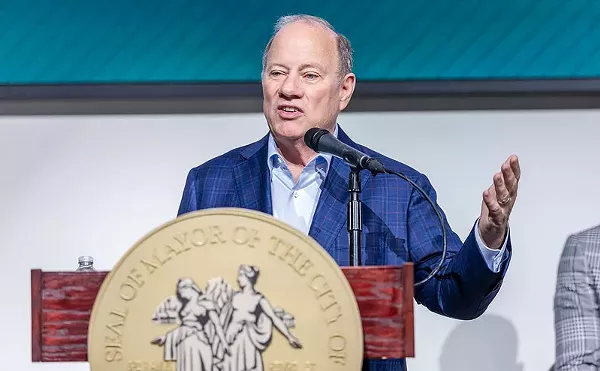
Audio By Carbonatix
[
{
"name": "GPT - Leaderboard - Inline - Content",
"component": "35519556",
"insertPoint": "5th",
"startingPoint": "3",
"requiredCountToDisplay": "3",
"maxInsertions": 100,
"adList": [
{
"adPreset": "LeaderboardInline"
}
]
}
]
By now, you’ve probably seen the messages from on high – high above metro-Detroit freeways on billboards, that is.
"What part of ‘Thou Shalt Not’ didn’t you understand? – God"
"Let’s meet at my house Sunday before the game. – God"
"You think it’s hot here? – God"
As far as we can tell, the Almighty hasn’t taken up self-promotion. Rather, the "God Speaks" campaign, as it has come to be known, is an advertising product of the Fort Lauderdale, Fla.-based Smith Agency, which created 18 religion-based messages for highway billboards and buses.
"We wanted to make people think," says the agency’s Andy Smith. "We’re targeting people who no longer attend church on a regular basis."
The campaign began last fall in Florida, with $150,000 from an anonymous donor. The ads caught the attention of the Outdoor Advertising Association of America, which convinced its membership, the big billboard companies, to take the campaign national as a public service.
According to OAAA spokesperson Sheila Hayes, the companies’ response was "phenomenal." The goal was to have $15 million in donated space and 10,000 billboards nationwide during the first year – and in less time than that, they’ve already surpassed the target number of billboards.
"It’s the perfect use of outdoor advertising," says Hayes. "Get attention with just a few words. Make an impact."
Most of the messages are warm-hearted or encouraging – "Tell the kids I love them – God" and "Need a marriage counselor? I’m available – God."
But others can be pretty testy: "Keep using my name in vain and I’ll make rush hour even longer. – God."
"It’s our job to create messages that encourage the use of a product, that motivate people to try a service," says Smith. "We think this campaign is the way God would speak to people in a ’90s way. We hope people who have drifted away from the church will say ‘This is cool’"
But will they come back into the fold? Getting butts back in pews was the goal of the 1981 campaign that’s credited with being the first church advertising to use hip, modern vernacular. The client was George Martin, at the time rector of St. Luke’s, now vicar of Sts. Martha and Mary, both Episcopal churches in Minneapolis.
Martin hired one of the hottest young creative shops in America, Fallon-McElligott-Rice, to develop a campaign for his church. The resulting series of ads, which employed the prevailing creative style of the time – the juxtaposing of a single, strong image with an ironic headline – won numerous creative awards.
Martin parlayed those ads into a business, the Church Ad Project, which creates ads and marketing material, available through a catalog to churches of all denominations.
"Evangelism is believing in your product and putting it out there," says Martin. "It’s all about communicating. It has to be compelling, creative, persuasive."
Ad agencies see church advertising, usually done for free, as an opportunity to show off their creativity – or irreverence. "Free Admission. Plenty of seating. Two hours shorter than Titanic," says the headline of an ad created for the Wheatland Presbyterian Church, by Stoner Bunting Advertising, both of Lancaster, Pa.
Cardinal Maida, the Archbishop of Detroit, gives the God Speaks campaign his blessing. The messages "echo church teaching in a creative and catchy manner that gets attention," he says.
But some non-Christian spiritual leaders aren’t as enthusiastic. The Venerable Samu Sunim, a Zen priest and head of the Buddhist Society for Compassionate Wisdom, which has a temple in Ann Arbor, thinks it’s good to encourage people to "love thy neighbor." But he’s concerned that they might invoke a lack of tolerance for religions that might not share a belief in a Christian-style God.
Other religious groups view it differently. "In one way I’m pleased to see the campaign," says Imam Hassan Qazwini, religious leader of the Islamic Center of America Mosque in Dearborn.
"Our society is swamped in materialism, and it’s good to see it getting back to God." But Qazwini thinks these messages are too commercial. "God is not commercial. God is not a product. We need a more holy message, a purer call for people to find God in their hearts."
David Neff is one Christian who is concerned about making God into a product. Neff, executive editor of Christianity Today magazine, likes the God Speaks campaign, but warns against the "commodification" of religion – making religion into a commodity, like a Lexus or a Quarter Pounder with cheese. He points out the double bind Christians are in – condemning the consumer culture, but then using the culture’s most powerful tool, advertising, on their own behalf.
"Advertising’s aim is to bypass our rational faculties," says Neff. "Short, powerful messages like billboards totally bypass the thinking process and simply create an image for a product."
The danger is that people will go to a church not because of their belief, but because they have an image of what the church can do for them – "consumer religion" in Neff’s words.
But Martin doesn’t see the problem. "The mark of great advertising is that people talk about it. Advertising with an edge of brilliance and honesty moves through all the clutter and finds a place in the memory."
Something like Jesus’ ministry itself, he adds.
Catching teens
If creating an "image" is important in religious advertising, it’s even more important for youth-directed efforts such as Teen Mania Ministries and RockRageous Youth Ministries. These groups, which typically preach fire, brimstone, sexual abstinence and other way-cool stuff, use tactics that attract the kids they’re trying to reach.
The RockRageous Web site (http://www.rockrageous.lwcc.org/) uses MTV-style graphics for its Truth Detectors, Sin Deflectors, Faith Inflators and "Devil Booty Kickin’ Time words of victory!" Steve Munds, the pastor of the Minneapolis-based group, says that since kids spend so much time in cyberspace, "we’ll be there for them."
Ron Luce, president/CEO of Texas-based Teen Mania, agrees. "We have to compete with all of the other stuff out there directed at kids. … So we have to use their techniques, have their look. Kids expect it."
Teen Mania relies heavily on a Web site (http://www.teenmania.org/) to spread God’s word and to promote weekly rock concert-like rallies that attract thousands of teens to halls and arenas across the country. And it seems to work: Recently, more than 70,000 kids attended one of these events, billed as "the beginning of a moral revolution in America," at the Pontiac Silverdome.





